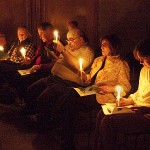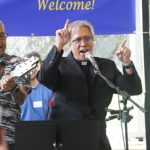In November of 2013 Pope Francis wrote a letter to the church titled The Gospel of Joy. He said some very startling things. He said, ‘I want to remind priests that the confessional must not be a torture chamber but rather an encounter with the Lord’s mercy which spurs us on to do our best.’ Pope Francis said, ”I prefer a Church which is bruised, hurting and dirty because it has been out on the streets rather than a Church which is unhealthy from being confined and from clinging to its own security.’
As regards this feast of Corpus Christ the Pope has this to say about Holy Communion, ‘it is not a prize for the perfect but a powerful medicine and nourishment for the weak. Before we receive Holy Communion we say ‘Lord I am not worthy that you should enter under my roof, say but the word and my soul shall be healed’ No one of us is worthy to receive the Body of Christ. Worthiness has nothing to do with our coming to receive Holy Communion. Need has everything to do with our coming to the priest or a minister of the Eucharist holding out an empty hand to show our neediness, our weaknesses and our struggles. The Body of Christ, the bread of life is a gift not a reward though I think that through the years we have been taught to see it as a reward for behaving ourselves. The Body of Christ is meant to nourish us, strengthen us, encourage us to get up and keep on trying when we know we have failed. When we walk up to receive the Body of Christ we are answering Christ’s call to all, ‘Come to me all you who labor and find life burdensome and I will refresh you.’ The Eucharist is not a prize for the perfect but a powerful medicine and nourishment for the weak.’
Different times in years past I would celebrate Mass for Sisters in their convent chapel. This was in the days when we all wore our religious habits. We all received Holy Communion on the tongue. When a sister received Holy Communion she would flip her veil over her head to keep out any distractions at this moment. She was to be alone with Jesus. This was a special time requiring peace and quiet. When you go back to your place after receiving Holy Communion you probably close your eyes and say your private prayers. You speak to Christ about your own or your family issues. You pray for family and friends who are ill or out of work. You’ll pray for harmony in the family. You may pray for family members and friends who feel it is no longer important to be with us here as we praise and thank God. In that short quiet time you place before the loving Christ the burdens of your life – trusting his promise ‘and I will refresh you.’
But there is far more to Holy Communion that Jesus and me. In the second reading Paul teaches us that our personal act of holding out an empty hand to receive the Body of Christ makes us one with every other person who has done the same. We who are many are one body for we all partake of the one bread. For Paul, receiving Holy Communion binds one not only to Christ but also to one another, to the entire Christian community . The Eucharist has a horizontal as well as a vertical direction. When we receive Holy Communion we are involved in the wellbeing of the Church and of the world, the Body of Christ.
The Body of Christ, the whole human family is plagued with so many problems. Social injustices, the exploitation and oppression of women and children, the unjust distribution of wealth, the human assault on the environment, the homeless and the hungry of our city and country, the effects of our consumerism on the health and wellbeing of Earth, the civil wars blighting so many countries, these too should be the things we bring to Christ when we receive him in Holy Communion, a conscious act that makes us one with the total Body of Christ. We may feel we cannot change the world but we can make every effort that the world does not change us. Pope Francis talks about the globalization of indifference – we tend to block out these harsh realities from our lives. This is not a good thing. These realities touch our lives too. We did not weave the web of life we are a strand in the web and what happens to the web happens to us and we should be conscious of wellbeing of the total web of life.
We’ll continue to celebrate this Mass as we celebrate Christ’s goodness and graciousness to us as he encourages each of us – this is my body, take and eat – this is my blood, take and drink.
 Founded by St. Paul of the Cross, every Passionist takes a special vow to spend his or her energies in promoting remembrance of the sufferings of Jesus, the memory of the Cross, and reflection of the meaning of the Cross for the world.
Founded by St. Paul of the Cross, every Passionist takes a special vow to spend his or her energies in promoting remembrance of the sufferings of Jesus, the memory of the Cross, and reflection of the meaning of the Cross for the world.




